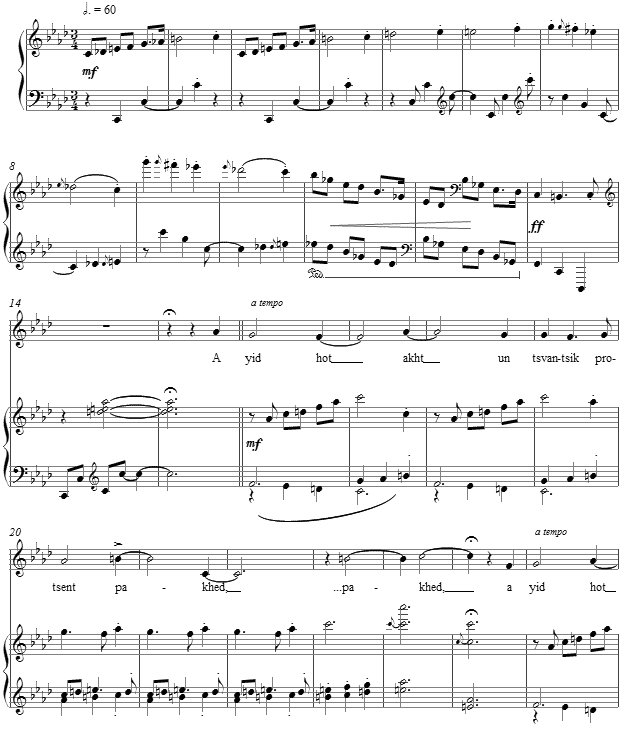Music and Texts of GARY BACHLUND
Vocal Music | Piano | Organ | Chamber Music | Orchestral | Articles and Commentary | Poems and Stories | Miscellany | FAQs
Chutspeh - (2008)
חוצפה
Yiddish folk saying
for medium high voice and piano
א
ײד האט אכט־און־צװאנציק פראצענט פחד٫צװײ
פראצענט צוקער און ז׳בעציק פראצענט חוצפה׃
[ 4 pages, circa 1' 30" ]
A Jew is made out of twenty-eight percent fear, two percent sugar and seventy percent chutzpah. [ 1 ]
Given the European history of Jews in that portion of the Diaspora, fear was a common emotion and with good reason. Ashkenazim -- North European and Russian Jews -- were subject to restrictive laws, discrimination and pogroms not to mention expulsions from time to time throughout an unsettled history until late in the twentieth century, the Holocaust under the Nazis being the culmination of a horrific history with an even more horrific genocidal crime against millions. This folks saying begins therefore with the reality of fear in the lives of European Jews, balanced ironically by only "two percent sugar."
But the largest measure is characterized by the wonderful word, chutzpah, which may be said to have myriad meanings from the very admirable to the more unhappy connotations of the word. But by and large, without such chutzpah Jewish life would have been snuffed out many times over, rather than have survived, grown and changed as a religious and cultural heritage for the modern world.
Written for a medium high tessitura, the setting begins with an "in one" piano introduction. The text is broken into sections for each of three attributes, and then conflated into one statement of this wonderful folk saying, ending with many repetitions of the word. Chutzpah? Why not chutzpah?
The score for Chutspeh is available as a free PDF download, though any major commercial performance or recording of the work is prohibited without prior arrangement with the composer. Click on the graphic below for this piano-vocal score.
NOTES
[ 1 ] Normally transliterated and used in the larger patois of English as "chutzpah," the transliteration of this text as "chutspeh" in the score itself reflects the more normal Yiddish pronunciation, as found in a number of transliterated texts. The final vowel is most usually sounded as a neutral schwa ( the symbol is "ə" in the International Phonetic Alphabet ) rather than the broad, open "ah." Another transliteration often found is spelled "khutspe." I chose to use the transliteration above, to make the word more recognizable to those less comfortable with sounding out Yiddish from a transliteration, and so closer to the normal patois, "chutzpah."
